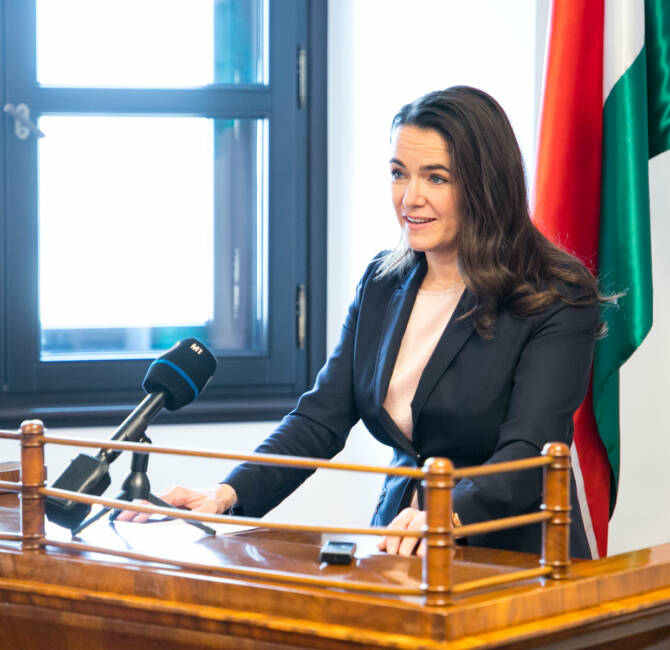This article has been published online by the Magyar Nemzet on March 26, 2021.
Exactly three-quarters of a century have passed since, on March 28, 1946, the Czechoslovak National Assembly enacted the provisions issued by President Edvard Beneš between April and October 1945. Among 143 so-called Beneš decrees, 13 directly and 20 indirectly affected the ethnic Germans and Hungarians from the Highlands (“Upper Hungary”, the region of today’s Slovakia that was once part of the Kingdom of Hungary), classifying them as collectively guilty. In an effort to completely undermine these minorities – in both civil and human terms – they were deprived of citizenship, expelled from their homelands, prohibited to use their mother tongue, confiscated of their property, all while enduring looting, physical torture and the destruction of their education systems and cultures. And so on. To put it even more simply: this was a somewhat covert, refined and well-thought-out plan for genocide and annihilation.
Kálmán Janics, who was one of the first to bring it out into the open, wrote in his work, “Czechoslovak policy and the Hungarian minority, 1945-1948” with an introduction by Gyula Illyés (in the 1979 version published by the European Protestant Hungarian University): “the liquidation plan enacted against the Hungarian minority failed mainly due to powerful interests, but also because of simple luck”. Edvard Beneš, the liquidator – this was the book title that his compatriot, Sidonia Dedina, published in her documentary novel in 2004, referring to the first-class political criminal, arch villain. (Just as a reminder, the Beneš decrees are still in force even today.)
Shortly before the 75th anniversary, the Slovakian State Secretary of the Ministry of Foreign Affairs recently said he would not allow ethnic Hungarians in Slovakia to acquire citizenship because it would cause problems similar to eastern Ukraine, South Ossetia, and Abkhazia. This is a provocation, according to our Foreign Minister Peter Szijjártó, as it is unacceptable to categorize Hungarians as anarchic, destabilizing agents. Just as it is unacceptable for a government official to compare the situation of Upper Hungary to the frozen conflicts of the Caucasus. And the Slovakian response: to summon the Hungarian ambassador in Bratislava to the Slovak foreign ministry and – as per usual – accuse the Hungarian side of interfering in internal affairs.
It is as if we have had to live in loss for these 75 years. Constantly. Regardless of political systems and leaders. Who would have thought that thanks to one of the greatest Hungarian poets of the 20th century, István Sinka, who offered a unique gesture to the Slovakians who lived alongside us Hungarians in the Highland region, near the end of the 30s when the Hungarian regions of Czechoslovakia and Transcarpathia from Ukraine were reunited with Hungary. An excerpt from his poem titled, “A Small Nation with Enormous Grief”:
“The law of mountains and plains: stay together / Unhappy nations, this is how we live forever! / It’s better to come – and for us to go too / instead of bloodshed and gunfire / It’d be good for us and for you too, over there / if we weren’t spinning crowns of thorns for each other… / I heard it long ago… I almost forget the words, the sounds – here and there / my father told me: it doesn’t matter where you come from / whether they wear boots or not / sadness, joy remains the same / on the mountain and at the base / But yes: you must fight for freedom / But do it as I say: / do not laugh like a fool / at the trials of other nations. / Because if it is better for us to laugh / the grief of both lands will be greater.”
The friendship-fraternity offered at such a crucial time in history was not accepted, just like so many times before and after. (As in other “relevant cases”) A voice for the Slovaks, was the subtitle of the poem. But the voice flew off into the distance without an echo. And coming back to today: Hungary, during the aforementioned affair, (and thus the Sinka effect!) is helping Slovakia obtain the Russian vaccine…
Of course, we are aware that desperate times call for desperate measures. Since the explosion of the migrant crisis in 2015, a clear community of interest has emerged with the Czech and Slovak nations thanks to the Visegrád cooperation – with some truly promising joint diplomatic measures and results at the time.
However, a system of diplomatic and foreign policy interests entanglement is one thing, while national politics is another. Because nothing has really changed in the past 75 years since; the bitter fact is, the good Palóc (subgroup of ethnic Hungarians in northern Hungary and southern Slovakia) people of Gömör (former territory of the Kingdom of Hungary) are head-to-toe Hungarians, and the proud Krasznahorka (Krásna Hôrka) Castle is part of the Hungarian history and national identity just as Rákóczi’s tomb on the Kassa (Kosice) hill, Pál Merse Szinyei’s home in Sáros (Šariš), the beautiful main square in Bártfa (Bardejov), and the river island Csallóköz (Žitný ostrov). All Hungarian treasures located within Slovakia’s present-day borders. (Not to mention the DAC – Dunaszerdahely football team and the “Nélküled – Without You” anthem.)
One of the most promising contemporary Hungarian writers embodying a spirit of nationalism, Ákos Jezsó, published a novel trilogy of which the first came out in 2017 (I’m Going Beyond) and the second was published just days ago (Candle in the Fog). The author, an ethnic Hungarian from southern Slovakia, presents the same fateful tragedies that his ancestors suffered through a sea of struggle that our Northern brethren have had to withstand, much like the depictions in the exceptional works of authors Lajos Grendel and László Dobos, also from the same region.
The aforementioned is precisely the reason why we have to pay attention to this long-ago (75 years old) loss. And vigilantly. Not just because we know from practice what communist shortage-management leads to, but also because another great poet – who was composing a century before István Sinka – János Arany, put these lines onto paper that should be taken into consideration:
“And the current of time does not flow back, / It swells forth, unstoppable.”
Do we understand this and see this? Do we see it enough? Do we do enough? Maybe we are good, better, but we could be even more forceful – tactics and compulsions here or there. (See: “Homeland Before all Else”, Ferenc Kölcsey) And will the unstoppable current of time swell forth or wait?
In a way, three-quarters of a century is a long time. 75 years of loss, 75 years of mystery. Or maybe it is something else?




